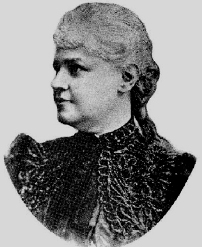3.1.8.1 The poetic work and feminist discourse of Aurelia Castillo de González (1842 – 1920)

The life and literary career of Aurelia Castillo is especially important for reconstructing the history of feminist thought in Cuba; a feminism in this case rooted in a high-caliber humanist ethic and demonstrating the intellectual acumen of Cuban women, despite the limited cultural and educational opportunities they enjoyed in that society, generally confined to the narrow sphere of the domestic sphere.
She began writing at a very young age in Camagüey, her hometown. Married to a colonel in the Spanish army, she was forced to leave the country in 1875 due to her husband’s protests against the execution of Miguel Acosta and Antonio L. Luaces.
In 1877, she received a second prize from the Colla de Sant Mus Society for a study carried out on Avellaneda. She dedicated part of her life to shedding light on Cuban poetry written by women and opening spaces for them in the publishing world of the time, which was strongly male-dominated, all based on her conception of the need to weave gender solidarity networks to try to reverse the status quo in culture and society.
Coincidentally, on February 24, 1895, a text of hers was published in “El Fígaro,” containing a phrase that is striking for its truthfulness and beauty: “A great revolution is taking place among many others in our days; women are claiming their rights. They have been the last servant of the civilized world. Even worse: until now, they have been the derisory sovereign of a society that is both gallant and brutal.”
Her poetic work was not extensive, filled with romantic reminiscences that were not entirely undone by the onslaught of modernism, with an intimate expression and a hymn to love that shows that feminism has not been at odds with the need for physical and spiritual closeness to the masculine. Perhaps her early widowhood or the double exile she suffered, although not for very long periods, motivated her poem “Expelled,” from which some stanzas are transcribed:
“You left forever. I was left alone in the world.
My tears flowed year after year…
They shouted at me from above: “Go!”, and I wandered,
And at last I found myself back in our old home.
Your loving spirit floated everywhere.
He sang with the birds, he perfumed the flowers.
With the sad vesper he sent me your shroud
And wrapped in it I dreamed of our sweet loves.
(…)
And when she was resting peacefully in that dream
In our sacred home I heard the childish voice.
Criminal hands touched my body
And the spiteful archangel shouted again: “Come on!”
Throughout his life, he contributed to numerous periodicals. During his time in Spain, he published articles in Cádiz, Crónica meridional, and El Eco de Asturias. Once in Cuba, he contributed to La Luz, La Familia, El Camagüey, El Pueblo, El Progreso, Revista de Cuba, Revista Cubana, and La Habana Elegante.
During the Republican era, she founded the National Academy of Arts and Letters, later serving as deputy director of its Literature section. She edited the works of Gertrudis Gómez de Avellaneda and the poems of José Martí for the first edition of his Complete Works. She also contributed to Bohemia, Social, and Cuba Contemporánea.








